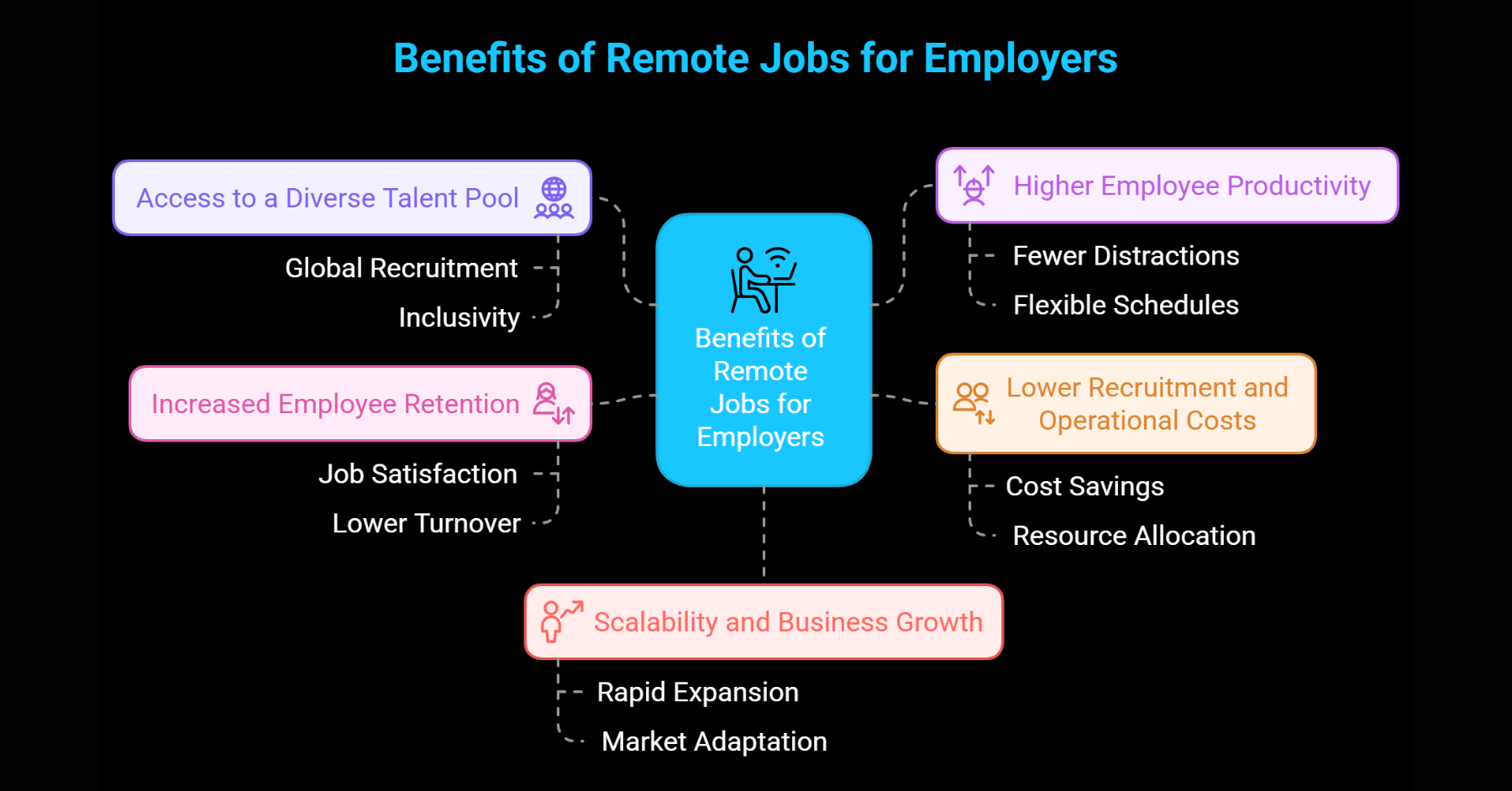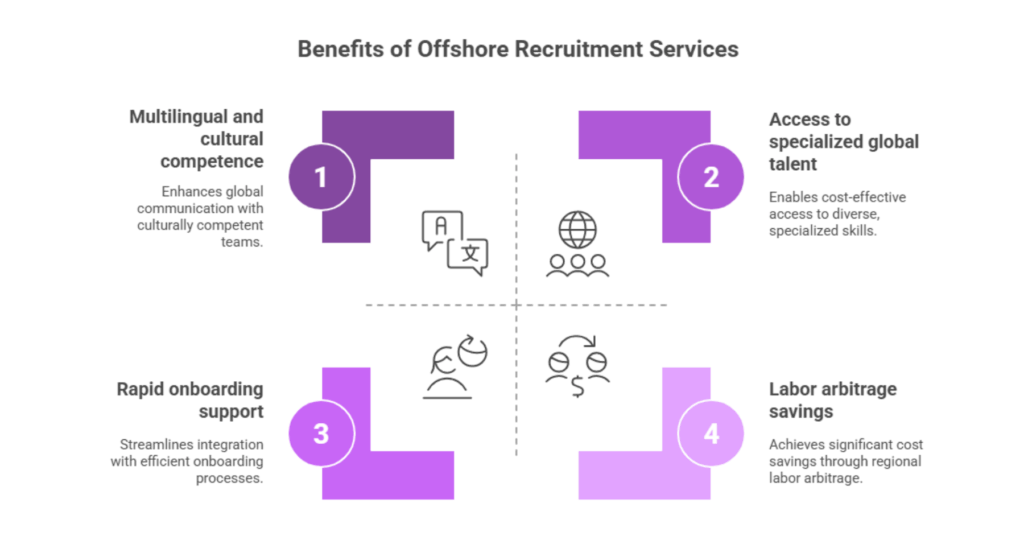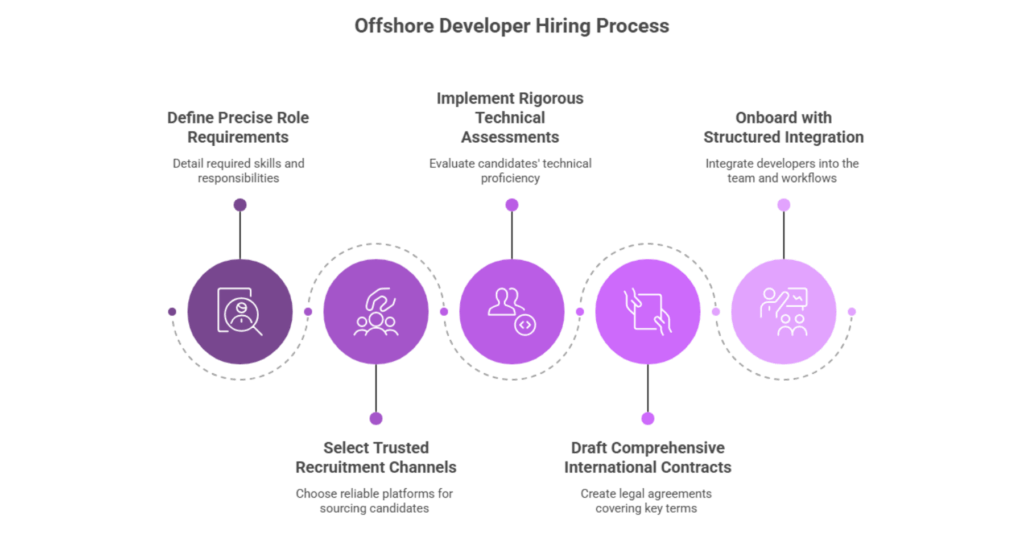“Remote jobs are bridging the gap between employers and employees, connecting top talent with opportunities worldwide and transforming the modern workforce.”
The workplace is evolving, and remote jobs are leading the transformation. With businesses expanding their workforce beyond geographical limitations, remote work has become a powerful bridge connecting talent with opportunity. Companies no longer need to rely solely on local hiring, while job seekers can explore positions from anywhere in the world, creating a more dynamic and inclusive job market.
Remote jobs offer numerous benefits for both employers and employees. Companies gain access to a wider talent pool, reduce hiring costs, and improve operational flexibility. Employees, on the other hand, enjoy better work-life balance, increased job options, and the ability to work from locations that best suit their lifestyle. This shift has led to a win-win situation, where businesses can hire the best talent regardless of location, and professionals can pursue careers without being restricted by geography.
This article explores how remote jobs bridge the gap between employers and employees, the advantages they offer, and how Remote Recruit helps both parties navigate the growing world of remote work. Whether you’re a business looking for skilled professionals or a job seeker searching for remote opportunities, remote jobs are redefining how talent and opportunity connect.
The Growing Demand for Remote Jobs
Remote work is no longer a niche trend—it is now a mainstream employment model that benefits businesses and workers alike.
-
Companies Embracing Remote Hiring
Businesses across industries are actively shifting to remote work models to tap into a global talent pool. This approach allows them to hire the best professionals without being limited by location. -
Advancements in Digital Collaboration Tools
The rise of cloud-based platforms, video conferencing, and project management tools has made remote work more seamless and efficient. Teams can now collaborate effectively, regardless of location. -
Changing Workforce Preferences
Many professionals now prioritize flexibility and work-life balance. Remote jobs offer the freedom to work from anywhere, making them highly attractive to top talent. -
Cost Savings for Employers
Companies can reduce overhead costs associated with office spaces, commuting, and utilities by hiring remotely. This makes remote hiring a financially smart decision. -
Global Talent Accessibility
Remote jobs enable businesses to recruit skilled professionals from diverse backgrounds, fostering inclusivity and innovation. Companies can hire based on expertise rather than geographic proximity.
How Remote Jobs Benefit Employers
Businesses that embrace remote jobs gain significant advantages, from accessing top talent to reducing operational costs.
-
Access to a Diverse Talent Pool
Remote hiring allows companies to recruit candidates from across the globe, increasing diversity and fostering a more inclusive workplace. This leads to innovative ideas and improved problem-solving. -
Higher Employee Productivity
Studies show that remote employees often perform better due to fewer workplace distractions, flexible schedules, and personalized work environments. Employers benefit from improved efficiency and output. -
Lower Recruitment and Operational Costs
Remote jobs eliminate expenses associated with office space, relocation, and employee benefits like commuting stipends. This allows businesses to allocate resources toward growth and innovation. -
Increased Employee Retention
Employees with the option to work remotely report higher job satisfaction, leading to lower turnover rates. Businesses that offer remote work opportunities often retain top talent longer. -
Scalability and Business Growth
Remote hiring enables companies to scale their workforce quickly. Businesses can expand operations without the limitations of physical office spaces, making it easier to adapt to market changes.
How Remote Jobs Benefit Employees
For job seekers, remote jobs provide career flexibility, financial benefits, and enhanced quality of life.
-
Work-Life Balance and Flexibility
Remote jobs offer the ability to work from home, choose flexible hours, and avoid stressful commutes, leading to a healthier work-life balance. -
More Job Opportunities
Professionals are no longer restricted by geographic limitations when job hunting. Remote jobs allow them to apply for positions at top companies worldwide, expanding their career prospects. -
Cost Savings for Employees
Working remotely reduces expenses related to commuting, office attire, and meals. Employees can allocate their savings toward personal and professional development. -
Greater Job Satisfaction
Employees who work remotely report higher job satisfaction, as they have more control over their work environment and schedule. This leads to better performance and increased motivation. -
Increased Access for People with Disabilities
Remote jobs create inclusive employment opportunities for individuals who may face challenges commuting to physical offices. This opens up more career paths for people with disabilities.
The Role of Remote Jobs in the Future of Work
Remote jobs are shaping the future of employment, providing sustainable solutions for businesses and professionals alike.
-
Hybrid Work Models Will Continue to Grow
Many companies are adopting hybrid work models that combine remote and in-office work, allowing employees to enjoy the best of both worlds. -
AI and Automation Will Enhance Remote Hiring
Recruitment platforms powered by AI are streamlining the hiring process, helping employers identify and hire top talent faster and more efficiently. -
Globalization of the Workforce
Businesses will continue to hire internationally, making remote jobs a standard part of the modern work environment. The ability to work from anywhere will become a key hiring advantage. -
Companies Will Invest More in Remote Work Infrastructure
Businesses are investing in digital tools, cybersecurity measures, and virtual team-building strategies to support a fully remote workforce. -
The Gig Economy Will Expand
More professionals are choosing freelance and contract-based remote jobs, allowing them to work on multiple projects while maintaining job flexibility.
Remote Jobs: A Simple Overview
Remote jobs are changing the way businesses and employees connect, offering new opportunities worldwide.
-
What are Remote Jobs?
Jobs that allow professionals to work from home or any location outside a traditional office. -
Why are Remote Jobs Important?
They offer work flexibility, reduce costs for employers, and provide employees with more job opportunities globally. -
How Do Remote Jobs Work?
Companies use digital tools to hire, manage, and communicate with remote employees, enabling efficient collaboration. -
Key Benefits of Remote Jobs:
- Access to global talent
- Increased productivity
- Lower operational costs
- Better work-life balance
-
How to Find Remote Jobs?
Job seekers can use specialized remote job platforms, optimize their resumes, and apply for online positions in their field.
Solutions Provided by Remote Recruit
Remote Recruit simplifies remote hiring for businesses while helping job seekers find top remote job opportunities.
For employers, Remote Recruit provides access to a diverse global talent pool, ensuring businesses can hire skilled professionals efficiently. The platform offers AI-driven candidate matching, video interview solutions, and tools to streamline the hiring process.
For job seekers, Remote Recruit offers exclusive job listings, career coaching, and resume optimization services. Candidates can access personalized job recommendations, interview preparation resources, and networking opportunities with remote-friendly employers.
Conclusion
Remote jobs have redefined how businesses and employees connect, offering new opportunities for career growth and talent acquisition. Companies benefit from cost savings, scalability, and increased productivity, while employees enjoy flexibility, job satisfaction, and access to a global job market.
Remote Recruit plays a crucial role in bridging the gap between employers and employees, making remote hiring seamless and efficient. Whether you’re a business looking for skilled professionals or a job seeker exploring remote opportunities, remote jobs are shaping the future of work.
Start your remote work journey with Remote Recruit. Sign up today to connect with top employers and discover exciting remote job opportunities!
Frequently Asked Questions (FAQs)
1. What industries offer remote job opportunities?
Tech, finance, marketing, customer service, and healthcare are among the top industries offering remote jobs.
2. How can businesses benefit from hiring remote employees?
They gain access to a global talent pool, reduce costs, and improve workforce productivity.
3. Are remote jobs suitable for entry-level professionals?
Yes, many companies offer remote positions for both experienced professionals and entry-level job seekers.
4. How can job seekers find remote job opportunities?
Using remote job platforms, networking, and optimizing online profiles can increase chances of landing a remote role.
5. How does Remote Recruit help with remote hiring?
Remote Recruit provides AI-driven job matching, video interview solutions, and hiring support for both employers and job seekers.




